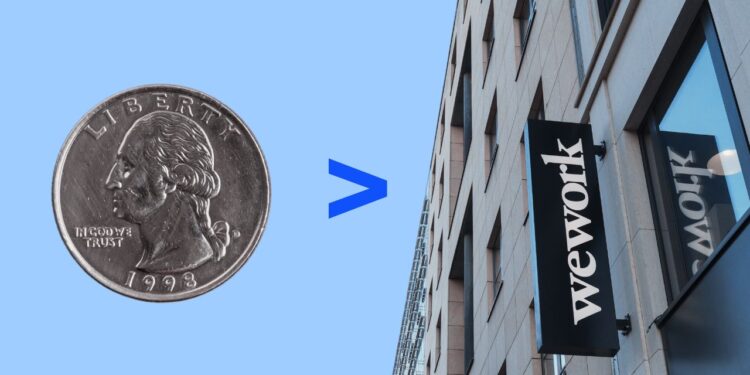What’s going on:
WeWork has announced that it will carry out a 1-for-40 reverse stock split of its outstanding Class A and Class C common stock, according to Reuters. The move is aimed at regaining compliance with the New York Stock Exchange (NYSE) listing requirements by bringing its share price back above the $1 threshold.
WeWork’s shares have seen a significant decline in value since its debut in October 2021. The company’s stock price dropped to 12 cents at opening bell on Friday, according to AP News. Earlier this month, WeWork warned of a possible bankruptcy in a SEC filing where it raised “substantial doubt” about its ability to continue.
Why it matters:
The flexible workspace provider’s decision to move forward with a reverse stock split follows yesterday’s news of another credit rating downgrade. The reverse stock split is an important move for the coworking giant and is one of the last plans still left on the table to retain listing on the exchange before its deadline to comply. The company was given six months to regain compliance when it received the non-compliance notice in April. The idea for the reverse stock split was approved in June by a shareholder vote — supported by 598 million shares. The announced split is at the very top of the approved range, which was between 1-for-10 and 1-for-40.
How it’ll impact the future:
Whether WeWork is successful or fails, the outcome will impact not just SoftBank, but the coworking industry in general, WeWork’s members, and commercial real estate markets where WeWork has a large presence. If WeWork’s efforts to regain compliance with the NYSE are unsuccessful — and if it ultimately goes bankrupt — it would create financial uncertainty for landlords, businesses, and professionals that rely on flexible workspaces provided by WeWork. In cities like New York, where WeWork has a strong footprint, the ripple effects on commercial real estate from a bankruptcy would be more evident.



 Dr. Gleb Tsipursky – The Office Whisperer
Dr. Gleb Tsipursky – The Office Whisperer Nirit Cohen – WorkFutures
Nirit Cohen – WorkFutures Angela Howard – Culture Expert
Angela Howard – Culture Expert Drew Jones – Design & Innovation
Drew Jones – Design & Innovation Jonathan Price – CRE & Flex Expert
Jonathan Price – CRE & Flex Expert












